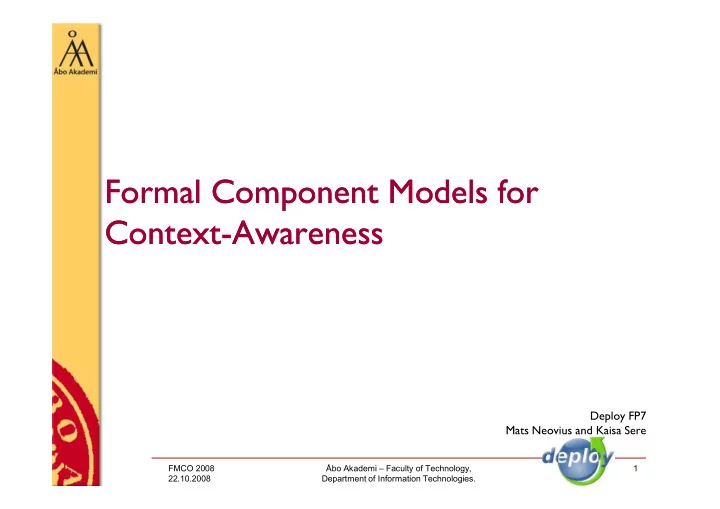

Formal Formal Component Component Models Models for� for� Context Context� �Awareness Awareness Deploy FP7 Mats�Neovius and�Kaisa�Sere FMCO�2008 Åbo�Akademi�– Faculty�of�Technology,� 1 22.10.2008 Department�of�Information�Technologies.��
Outline Outline of� of�this this talk talk � Motivation � Informal�definitions � Problem� – Modelling context�aware�system – Treating�the�contexts�as�components – Treating�the�contexts�as�components – Proposed�framework�for�solving�the�problem � Action�Systems�at�a�glimpse � Context�in�action�systems � Example:�fictionary driverless�car � Conclusion�&�further�work FMCO�2008 Åbo�Akademi�– Faculty�of�Technology,� 2 22.10.2008 Department�of�Information�Technologies.��
Motivation Motivation In�order�to�provide�rigour on�SW,�formal�methods�suffice � � However,�in�order�to�provide�rigour on�a�system,� environment�must�be�considered – Why�is�this�of�interest� • for�example,�if�the�car�breaks�down�the�problem�is�not� • for�example,�if�the�car�breaks�down�the�problem�is�not� malfunctioned�SW�or�erroneous�treating�of�sensor� reading,�the�main�problem�is�� a�broken�car. – In�a�system,�the�environment�is�a�decisive�factor,� we�need�to�introduce�it�“formally” • Consider�irrationality�and�force�the�designer�to�treat�and� include�which�and�how�for�instance�sensor�readings�are� acquired�and�calculated�with FMCO�2008 Åbo�Akademi�– Faculty�of�Technology,� 3 22.10.2008 Department�of�Information�Technologies.��
Informal�definitions Informal�definitions � Context (when talking about context�aware) – ���������������������������������������������������������������� ������������������������������������������������������������������� ���������������������������������������������������������������������� ����������������������������������������������������������������� ����������������������������������������������������������������� ������������������������������������� [Dey,�others] � Component – ������������������������������������������������������������������ �������������������������������������������������������������� ���������������������������������������������������������������� ��������������������������������� [Szyperski] FMCO�2008 Åbo�Akademi�– Faculty�of�Technology,� 4 22.10.2008 Department�of�Information�Technologies.��
Problem Problem – modelling modelling a� a�context context� �aware aware system system � How�is�an�elementary�context�utilised in� the�context�aware�SW (Elementary�context�denotes�for�instance�a�sensor�reading) – Need�to�specify�the�”utiliser�interface” – Need�to�specify�the�”utiliser�interface” � How�is�context�processed�to�provide� increased�information� – Composition�of�elementary�contexts – Need�to�specify�the�interface�between�the� processing�entities FMCO�2008 Åbo�Akademi�– Faculty�of�Technology,� 5 22.10.2008 Department�of�Information�Technologies.��
Problem Problem – Treating Treating contexts contexts as� as�components components � Avoid�a�monolithic�constructions�for�the� sake�of�independent�deployment�and�reuse � Information�builds�bottom�up – Elementary�contexts�form�the�basis�for� – Elementary�contexts�form�the�basis�for� context�aware�SW • Composition�of�contexts Accelerate ok�(given speeding is�prohibited)? acquire :�velocity �∧ speed_limit improve :�velocity >�speed_limit → speeding :=�true provide :�speeding FMCO�2008 Åbo�Akademi�– Faculty�of�Technology,� 6 22.10.2008 Department�of�Information�Technologies.��
Problem Problem – solution solution � Treat�context�as�a�service�to�its�utiliser – Utiliser able�to�acquire�information� whenever�desired�(triggered�by�something,� maybe�a�context)� maybe�a�context)� • Such�as�when�resolving�whether�or�not�to� accelerate�(previous�slide) – We�consider�each�so�called�elementary� context�as�a�component�in�its�own�right FMCO�2008 Åbo�Akademi�– Faculty�of�Technology,� 7 22.10.2008 Department�of�Information�Technologies.��
Problem Problem – solution solution view view � Context�utiliser /�application – Relies�on�some�context�service(s) • Proactive�(or�reactive) FMCO�2008 Åbo�Akademi�– Faculty�of�Technology,� 8 22.10.2008 Department�of�Information�Technologies.��
Problem Problem – solution solution view view � Context�utiliser /�application – Relies�on�some�context�services • Proactive�or�reactive � Context�service – Relies�on�a�set�of�context�processors – Relies�on�a�set�of�context�processors • Provides�an�answer�to�some�question FMCO�2008 Åbo�Akademi�– Faculty�of�Technology,� 9 22.10.2008 Department�of�Information�Technologies.��
Problem Problem – solution solution view view � Context�processor – A�triad,�CD�||�CI�||�CP • CD�– acquire�metrics • CI�– apply�algorithm • CP�– provide�a�metric�whose�information�have�been�increased • CP�– provide�a�metric�whose�information�have�been�increased FMCO�2008 Åbo�Akademi�– Faculty�of�Technology,� 10 22.10.2008 Department�of�Information�Technologies.��
Problem Problem – solution solution view view,� ,�all all together together Inspired by:� Henricksen and�Indulska,�”Modelling and�Using Imperfect Context Information”,�CoMoRea 2004. Shehzad,�Ngo,�Pham,�Lee�”Formal modeling in�Context aware systems” CAMUS�framework and�Contextual informtaion hierarchy FMCO�2008 Åbo�Akademi�– Faculty�of�Technology,� 11 22.10.2008 Department�of�Information�Technologies.��
Action� Action�systems systems at�a� at�a�glimpse glimpse � State�based�formalism,�based�on�Dijkstra’s guarded�command�language – A�predicate�(guard)�enables�a�statement� (body)�g� → S (body)�g� → S � =�|�[� • Atomicity import� imp_list ; • Non�determinism export� exp_list :=� e 0 ; var� var_list :=� v 0 ; • Parallelism�� proc� list of�pr.name ( par.name.list )� =�<{impl}> ; do�g 1 → S 1 []�…�[]�g n → S n od ]�|� FMCO�2008 Åbo�Akademi�– Faculty�of�Technology,� 12 22.10.2008 Department�of�Information�Technologies.��
Specialisations Specialisations of�action� of�action�systems systems � Context�is�non�changeable – New�declarations�of� • read_only :�published�by�some�other�AS • publish�:�read_only in�other�AS • publish�:�read_only in�other�AS ℬ =�|�[� • context�:�elementary� context c context(s) import� j ; export� f :=� f 0 ; read_only r; publish p� :=� p 0 ; var� w� :=� w 0 ; proc� ; do�g 1 → S 1 []�…�[]�g n → S n od ]�|� FMCO�2008 Åbo�Akademi�– Faculty�of�Technology,� 13 22.10.2008 Department�of�Information�Technologies.��
Recommend
More recommend